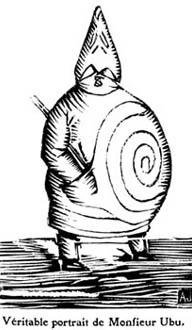User Login |
Spoiler Alert: An Inside Look At Potatoland's SanityHelp! I’m trapped in an existential wormhole and can’t get out. There are dead people everywhere, nothing is actually happening, and I think I just might turn into a desk lamp at any moment! This wild scenario was one of many felt by all who in the last three months have taken up the pilgrimage to St. Mark’s Church where Richard Foreman’s Ontological-Hysteric Theater resides. Celebrating forty years of avant-garde existence, his latest production, Deep Trance Behavior in Potatoland, with its spellbinding ability to rivet the most itinerant attention span, could quite possibly replace organized religion as a modern day cure for the antichrist. Upon entering the compact performance hall, we are confronted with a tilted array of screens, pianos, funeral urns, and whatsits seemingly based in some offset form of duality, a “double world” with two of most everything, the side walls plastered with clocks and framed grayscale portraits of deceased Victorians with ghostly apparitions hovering over their shoulders. The spectacle begins and the screens start rolling. A lone actress dressed in a cross between Cruella De Ville and Dracula’s demon bride walks onstage to where a candy dish awaits, picks out a small white pill and places it brazenly on her tongue. This ritual is to be repeated often by more than one of the performers throughout the distilled hour and two minutes that follows. As each scene morphs into the next, we are bombarded with an absolutely nonsensical madhouse of visual and auditory overstimulation that builds past known breaking points in the first quarter hour at which point the audience has no choice but to strap themselves in and hold on to their baggage of intellectual conditioning as best they can for the duration. We are left with no time or space to think, to process, to unearth privileged meaning or enlightened pleasure. Instead we are forced to accept unconditionally our own utter incapability to comprehend and thereby conquer our surroundings, a striking political contrast to the testosterone fueled, dog eat dog ideology that rules the large mass of our planet. Sure, there are a few rather ominous tidbits of crystal clarity here and there as we are told that “there is no relationship between what is happening on the stage and what is happening on the illuminated screen.” That is until there is, and we’re all spun for another round of chasing our mind’s tail as it winds further down the rabbit hole. I can offer you my own interpretation of events, which would be that Foreman has constructed a powerfully symbolic experience that simulates the interior of the human psyche to the finest detail. Though theater architecture in general could be philosophically construed in such a fashion, the physical set and action of the Potatoland stage presents a unique twist to the norm with its two screens or windows to an outer world of posing figures and transitory messages, pianos on display to represent the dueling influx of sound in opposite eardrums, actors either absorbed in their own drama or hell bent on distracting one’s awareness away from the crisis at hand, and the peanut gallery subconscious watching over while trying frantically to keep pace with the lot; one nice lucid package of easily assimilated intent consumed and forgotten. Except that there are deeper parallels at work in Foreman’s genius that can be obtained only from the mouth of the man himself. In the talk-back session in wake of the Tuesday night performance I attended, Foreman declared that any perceived subtext to his art is completely accidental. Relying on instinct or “infantile impulse” as his guide, he chooses not to think about the advert implication of his creations and does not personally seek any grand scheme in their design. “It’s easy to think of many great ideas,” he says. The trick is to discard the ones that don’t allow themselves to be instead of forcing them. His only objective is to “make the surface of things thinner and thinner…to reveal something else.” The film projected on the screens is shot and edited first, lacking any preconception of the stage. When on sight he finds it useful to pretend one is “filming like a documentary filmmaker in midst of a riot.” The actors are then scripted and blocked over an intensive three day period, where Foreman simply points and commands spontaneously without pause, striving to break continuity whenever possible. He also asserts that “language is the center…the keys around which everything vibrates” and that in any artistic endeavor one should “resist premature closure if you can.” After providing this creative formula, Foreman had numerous other insights to extend in response to questions concerning his overall outlook on reality. In an almost picture perfect moment of wizened sage nostalgia he advised that “if you can make paradise out of the negative things of life, the tensions, the neurosis…the garbage…then you’ve really made paradise.” And on that note, may the composting commence.
categories [ Poetry Reviews ]
login or register to post comments | printer friendly version
|
